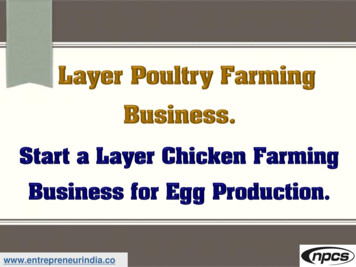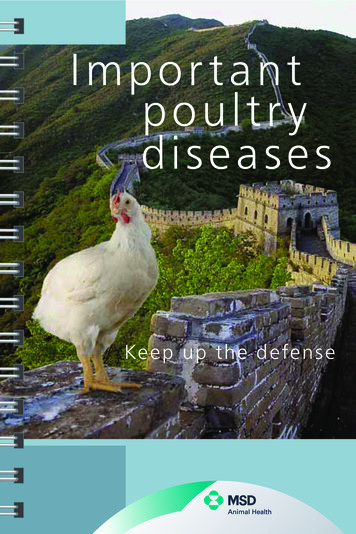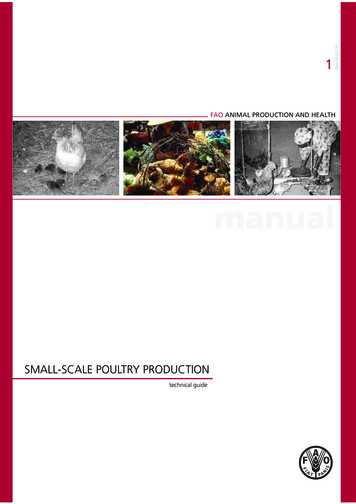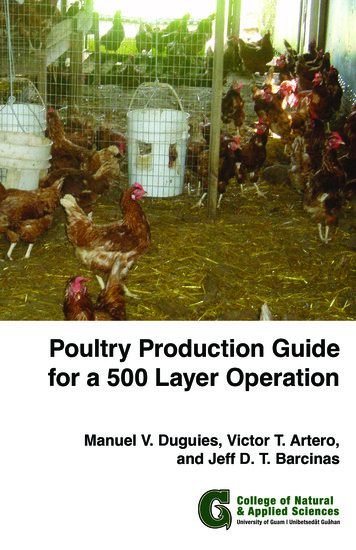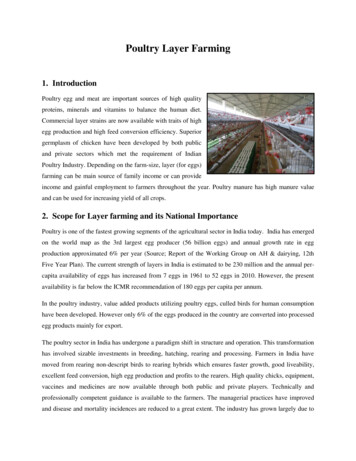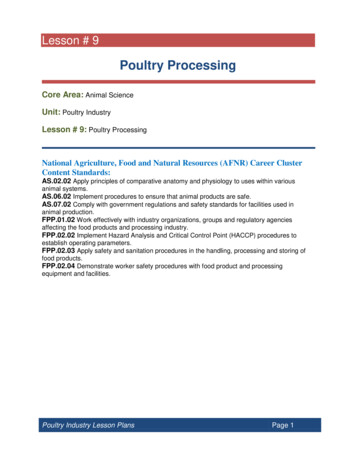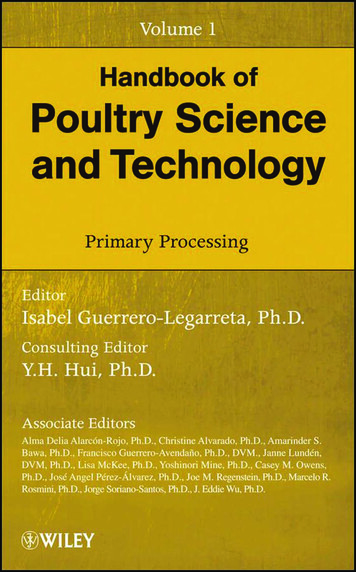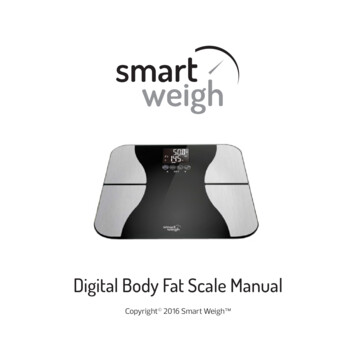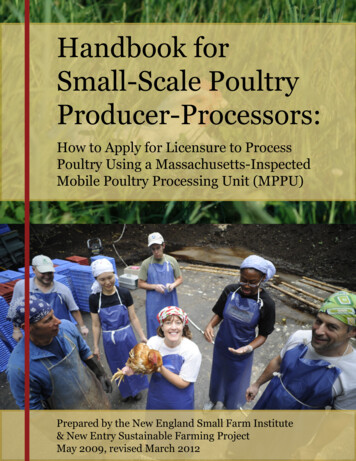
Transcription
Handbook forSmall-Scale PoultryProducer-Processors:How to Apply for Licensure to ProcessPoultry Using a Massachusetts-InspectedMobile Poultry Processing Unit (MPPU)Prepared by the New England Small Farm Institute& New Entry Sustainable Farming ProjectLicensure Handbook May 2009, revised- MPPUMarch2012-1-
{ Acknowledgements }This guide was produced byJennifer HashleyJudith GillanNew Entry Sustainable Farming ProjectNew England Small Farm Institute150 Harrison Ave, Rm. 121275 Jackson StreetBoston, MA 02111Belchertown, MA 01007www.nesfp.orgwww.smallfarm.orgGraphic design by:Meredith EpsteinIn collaboration with staff from:Massachusetts Department of Agricultural Resources’Bureau of Animal Health, Division of Regulatory Services, and Agricultural Business Training Programwww.mdar.govMassachusetts Department of Public Health’sFood Protection Programwww.mdph.govMassachusetts Department of Environmental Protection’sSolid Waste and Waste Water Divisionswww.mdep.govNumerous Local Board’s of Public Health in MassachusettsThis guide was developed with funding from the Massachusetts’ Agricultural Innovation Center,supported through the Massachusetts Department of Agricultural Resources and the NortheastSARE (Sustainable Agriculture Research and Education) Program.Other supporters of the Massachusetts Mobile Poultry Processing Unit include:Massachusetts Society of Promoting AgricultureUSDA Rural Development – Rural Business Enterprise Grants ProgramCopyright 2009, 2010, 2012 by New England Small Farm Institute andNew Entry Sustainable Farming Project. All rights reserved.This guide is a working document, please visit the NESFI and New Entry websites for information about any updates.We welcome limited duplication of contents of the Guide for non-profit and educational purposes. Please credit the source in all copies.- MPPU Licensure Handbook -2-
{ Table of Contents }Purpose of this Guide 4Overview 6Frequently Asked Questions & Answers 8Step-by-Step Guidance on Completing the Massachusetts Slaughter License Application18and Supporting DocumentsStep 1: Obtain a copy of and complete the Massachusetts “Application for Licensure toProcess Poultry within the scope of the Mobile Poultry Processing Unit Pilot”19Step 2: Complete a narrative description of your poultry production and processing plans 20to include with your license application form to MDPH FPPStep 3: Draw a sketch or locate a map of your site to mark facilities, proposed MPPU24location and other site informationStep 4: Apply for City / Town approval of slaughtering operation (MGL 111 s. 151)25Step 5: Include the MPPU Design Sketch and description of the processing equipment tobe used27Step 6: Include a copy of your product label for retail packages28Step 7: Include health certificate from hatchery29Step 8: Register with USDA FSIS as a “Meat and Poultry Handler”29Step 9: Submit application to MDPH FPP30Step 10: Verify MDEP / MDAR approval for waste removal / on-farm composting procedures 31Step 11: Complete approved training program 31What to Expect after you complete your Application for Licensure to Process Poultrywithin the Scope of the Mobile Poultry Processing Unit Pilot32APPENDIX A – List of Attachments 34APPENDIX B – Regulatory Resources 35- MPPU Licensure Handbook -3-
{ Purpose }This is an informational guide to aid small-scale poultry producers in the application process for a Massachusetts stateslaughter license to process poultry raised by the produceron their farm using a Massachusetts-licensed Mobile PoultryProcessing Unit (MPPU).Poultry producers in Massachusetts who raise and slaughter less than 20,000 birds annually, who do not engagein the business of buying and selling birds, and who do not conduct any interstate commerce are exempt fromUSDA inspection, but are not exempt from state inspection or licensure by the Massachusetts Department ofPublic Health’s Food Protection Program (MDPH FPP). This guide will help producers understand the stepsneeded to prepare for and to submit a slaughter license application and the required supporting documents tothe MDPH Food Protection Program. Renewal of the slaughter license is required annually.The document contains an overview of Massachusetts regulations regarding the slaughter of poultry and howthat applies to use of a Mobile Poultry Processing Unit. A series of frequently asked Questions and Answers(Q&A’s) are included to help clarify regulations and requirements. Also included in the guide are step-bystep instructions on compiling the necessary documentation to qualify for a license to process poultry on theproducer’s farm. The appendix contains attachments and required forms referenced in this document.Additional documents to be consulted in preparation of the license application to MDPH FPP include:MPPU Farm and Food Safety and Management Guide for Massachusetts’ Small-Scale Poultry Producers.This document includes information on: MPPU Safe Food Handling Plan Good Manufacturing Practices Standard Operating & Sanitation Standard Operating Procedures A Hazard Analysis Critical Control Point (HACCP) Plan designed for the MA-MPPU MPPU Operations Recordkeeping Logs On-Farm & Farm-to-Farm Bio-Security Practices Safe & Humane Poultry Processing & Handling Processing Water & Solid Waste Protocol & PracticesTechnical Guide to MPPU Equipment Operations and Maintenance*Guide to PAWS Compost Systems for Small-Scale Poultry Producers*- MPPU Licensure Handbook -4-
For producers who wish to construct a Mobile Poultry Processing Unit for use in their region, a Guide to theConstruction and Fabrication of a Massachusetts-licensed Mobile Poultry Processing Unit1 is under development andwill be available in Spring 2012.For technical assistance in completing the necessary application forms or to provide feedback on this guide,please contact:Jennifer Hashley or Sam AndersonJudy GillanNew Entry Sustainable Farming ProjectNew England Small Farm Institute155 Merrimack St., 3rd floor275 Jackson StreetLowell, MA 01852 Belchertown, MA978-654-6745 413-323-4531jennifer.hashley@tufts.edu jgillan@smallfarm.orgsanderson@comteam.org1 This guide is being developed with funding from the SARE grant.- MPPU Licensure Handbook -5-
{ Overview }There is a nationwide trend toward sustainable community farming practices including on-farmslaughtering. Small poultry farm operations tend to value and promote fresh, natural, healthy and morehumanely treated poultry. Streamlining local and state public health regulations and providing foodsafety support to small farmers is important to keep costs down for farmers and consumers whilepublic health regulatory oversight is essential in the food safety system to verify safe food handlingpractices and to maintain consumer confidence.Mobile poultry slaughtering operations consists of portable slaughtering equipment that can betransported from farm to farm and thus provide a cost effective alternative for small farmers tosafely bring their poultry to market. A number of states currently allow the use of such units, whichsignificantly reduces the cost of slaughtering for small farmers and addresses the need for greateraccessibility to slaughtering infrastructure which have declined over the years.Farmers who slaughter their own poultry at the farm for their own personal use or for their nonpaying guests are exempt from federal and state licensure, but are not allowed to engage in commercialsales. Small farm operations which slaughter less than 20,000 birds annually or do not conduct anyinterstate commerce are exempt from USDA (federal) inspection2 but not from state licensure inMassachusetts.2The federal Poultry Production Inspection Act (PPIA - USC, Title 21, § 451-470, and CFR, Title 9, Part 381) provides exemptions from federalinspection requirements for two categories of small-scale poultry producers who raise and process their birds on their own farms: “Smallest-scale” producers who raise and process 1,000 chickens or 250 turkeys each year; “Small-scale” producers who raise and process 20,000 or 5,000 turkeys each year.A federal inspector does not need to be present to examine the birds as they are being slaughtered and processed on these farms. Producersqualify by meeting the requirements described below. Poultry is sound and healthy and is slaughtered under sanitary standards, practices, and procedures that result in the preparation of poultryproducts that are not adulterated and that are sound, clean, and fit for human food. They produce and slaughter no more than the permitted number of poultry during the calendar year for which the exemption is claimed. All of the poultry is raised on their own farm. They are not in the business of buying and selling poultry products other than those produced from birds raised on their own farm. None of the poultry is distributed outside of the state where their poultry is raised.According to the PPIA, poultry produced under this exemption may be distributed by the producer directly to household consumers, restaurants, hotels,and boardinghouses for use in their own dining rooms or in the preparation of meals for sale to direct consumers.Notwithstanding this exemption, the federal Food Safety Inspection Service (FSIS) and state regulatory agencies may choose to examine processing facilitiesof any size to be sure that they are in compliance with laws and regulations requiring that poultry and poultry products be processed under clean and sanitary conditions and that the operation does not impact the environment in a negative way. The Massachusetts licensed MPPU has been designed to enablesmall-scale processors to meet these critical concerns.Additionally, in the regulatory language, you will often read the following statement: “Except, no person qualifies for this exemption if such person slaughtersor processes poultry products at a facility used for slaughtering or processing poultry products by any other person, except when a USDA/FSIS administrator grants such exemption after determining, upon review of a person’s application, that such an exemption will not impair the purposes of the PPIA Act.”However, in the case of the MPPU, FSIS has determined that when a grower producing poultry under the Producer/Grower Exemption rents slaughteringor processing equipment and operates such equipment on his or her premises, he or she is not disqualified for the Producer/Grower Exemption. In thissituation, the grower is not required to request an exemption from the Administrator of FSIS. However, the slaughter or processing unit may not be used toslaughter or process another person’s poultry while it is on the renter’s premises. Also, the federal Food Safety Inspection Service (FSIS) and state regulatory agencies may choose to examine processing facilities of any size to be sure that they are in compliance with laws and regulations requiring that poultryand poultry products be processed under clean and sanitary conditions and that the operation does not impact the environment in a negative way.Further information on state and federal laws and regulations that impact on-farm poultry processing by small producers in Massachusetts is availablethrough MA Dept. of Public Health.- MPPU Licensure Handbook -6-
Poultry slaughtering operations for intrastate commerce only are regulated by the MA Departmentof Public Health Food Protection Program (MDPH FPP). Such operations are licensed and inspectedin accordance with Massachusetts General Laws (MGL c. 94 and 105 CMR 530.000 Sanitation inMeat and Poultry Processing Establishments and 105 CMR 532.000 Inspection of Poultry and PoultryProducts). The MDPH Food Protection Program is responsible for evaluating the equipment (the Unit),the process, and the physical and sanitary facilities including water supply and food safety plans relativeto the source, slaughtering, processing, packaging, labeling and distribution of poultry for sale withinMassachusetts.Small farm operators may sell only their own whole, uncut poultry under the MA state meat andpoultry slaughter license in accordance with 105 CMR 530.000 and 105 CMR 532.000. On farm salesof such poultry by MA licensed producers under 105 CMR 530 and 532 are exempt from requirementfor a retail food establishment permit under 105 CMR 590.000-Minimum Sanitation Standards forFood Establishments-Chapter X as they are a state licensed food processor. Small farm operations maysell their own poultry in intrastate commerce directly to consumers as well as to retail food serviceoperations that are cooking the poultry. At this time, state regulation and policy prohibits the wholesaledistribution to retail markets (such as grocery stores, or off-farm retail farm stands) for resale.Small farms that have their poultry slaughtered off-site by another party at a state or a federallylicensed facility and then sell their packaged poultry directly to consumers in retail operations on thefarm or at farmer’s markets are subject to retail licensure by the local board of health in accordancewith 105 CMR 590.000. The Massachusetts Department of Agricultural Resources (MDAR) isresponsible for assessing live animal health prior to slaughter and both MDAR and the MassachusettsDepartment of Environmental Protection (DEP) are involved in evaluating waste disposal practicesat the farm. Animal slaughtering operations are considered a “noisome trade” and thus require initialapproval from the city or town in which the unit will be used accordance with MGL 111 S. 151Slaughter Houses, and must comply with local zoning regulations and public health ordinances.Appendix B lists references to the relevant Massachusetts general laws and regulations governing theslaughter, processing, and sale of meat and poultry products.This guide was created with the intent to aid small-scale poultry producers to understand and meet theregulatory requirements related to on-farm slaughter and processing of birds to enable producers tomarket locally producer poultry direct-to-consumer. This MPPU project has been a true collaborativeeffort between local non-profits, farmers, and local, state, and federal regulatory agencies.- MPPU Licensure Handbook -7-
{ Frequently Asked Questions }1. Who may apply for initial licensure to process poultryusing a licensed mobile poultry processing unit (MPPU)?Agricultural producers of chickens or turkeys who plan to raise 20,000 or fewer chickens or 5,000 or fewerturkeys3 in any one calendar year, and process them on their own farms for direct sale of the whole raw birdsto consumers, must apply for a state license with the Massachusetts Department of Public Health’s FoodProtection Program to process poultry and use a Massachusetts-inspected MPPU. If you plan to raise poultryfor your own personal consumption and that of your non-paying guests (no birds will be sold commercially),you do not need to obtain a Massachusetts slaughter license.2. How can I obtain a Poultry Slaughter License?License information and application forms may be obtained from the Massachusetts Department of PublicHealth’s Food Protection Program, Bureau of Environmental Health. The document is called “Application forLicensure to Process Poultry within the Scope of the Mobile Poultry Processing Unit Pilot in Accordance withM.G.L. C. 94, § 120 and/or 105 CMR 530.000 and 532.000 and in Accordance with Exemption Association withthe Federal Poultry Products Inspection Act.”Contact:Massachusetts Department of Public HealthFood Protection Program, Bureau of Environmental Health305 South StreetJamaica Plain, MA 02130-3597(617) 983-6700 Fax: (617) 983-6770http://www.mass.gov/dph/3USDA Producer-Processor Exemptions equate 1 turkey 4 chickens. The maximum number of birds that can be produced under these exemptions is20,000 “chicken units” or the equivalent number of turkey units or other poultry species.- MPPU Licensure Handbook -8-
3. What information do I need to provide to apply for astate slaughter license?The licensure process includes an Application Form to MDPH FPP (see attachment, Appendix A), supportingdocumentation, and other state and federal agency approvals. You will also provide:The completed Slaughter License Application Form with a 225 application fee.A Site Diagram of your farm site that clearly shows the location of: Your poultry rearing facilities and/or pastures. The area where you will locate the MPPU. Your closest neighbors. Storage areas for processing supplies and products (e.g., packaging materials and labels) and onfarm refrigeration and/or freezers. Any wells or surface water located on your farm site. The biologically active farm fields and compost areas you will use for disposal of processingbyproducts (rinse water and solid processing waste). The toilet facilities you will make available for use by processing personnel.Affirmation that you agree to receive (or documentation that you have received) mandatory training inMPPU safe food handling and waste management practices.Documentation that the water you will use for making ice, cleaning, rinsing, sanitizing and processing/chilling has been tested and is “potable.”A copy of your proposed poultry processing schedule, including slaughter dates and numbers and speciesof birds to be processed on each date.A description of your proposed rinse water and solid waste disposal plans and practices.A description of your proposed marketing plan.A copy of the design plans for the MPPU you plan to use.Town/city approval for MPPU use.Indicate which Federal USDA exemption is being claimed for the license period (custom slaughter,producer grower/1,000 bird limit, producer grower/20,000 limit, producer grower or other person/PGOP,or Small Enterprise).Complete a registration form with USDA (FSIS Form 5020-1, Registration of Meat and Poultry Handlers)on an annual basis.- MPPU Licensure Handbook -9-
Once your completed Application is received, you will be asked to schedule a site assessment visitbefore the permitting process is complete. Upon successful completion of the site assessment, you willreceive a copy of your numbered Permit by mail. You may not begin to slaughter, process or sell birdscovered by this permit until you have received your permit. You can expect the process to take at least30 days from receipt of your application. Due to other required state and local regulatory approvals, itis recommended you begin the process of applying for licensure as early as possible prior to your firstanticipated slaughter date.4. What do I need to do to become eligible to borrowthe MPPU and use the equipment on my farm toprocess my birds?To schedule use of the MPPU, you must have a valid slaughter license from the MassachusettsDepartment of Public Health’s Food Protection Program and approval from the local town where theunit is to be used. Producers will also need to demonstrate that they have received food safety trainingand training on MPPU operations and maintenance. Producers will also need to sign a rental agreementand a waiver of liability to use the MPPU. To schedule use of the Massachusetts-licensed MPPU, pleasecontact:Eastern and Central Massachusetts: Sam Anderson or Jennifer Hashley, New Entry SustainableFarming Project, 978-654-6745 or by email at: sanderson@comteam.org or jennifer.hashley@tufts.edu.Western Massachusetts (Pioneer Valley): Judy Gillan at the New England Small Farm Institute,413-3234531 or by email at: info@smallfarm.org.5.Can I take my birds to another farm that is licensedto use the MPPU and process them or have themprocessed for me to sell to my customers?No. The producer licensed to process poultry using an MPPU is only allowed to slaughter and sell birdsthey have raised on their own farm under the USDA producer-processor exemption. The MPPU andthe federal Producer Grower exemptions comply with 9CFR381.10(b)(2) when a producer-growerrents the unit to slaughter and process his/her poultry on his/her premises and does not slaughteranother person’s poultry on his/her premises.- MPPU Licensure Handbook - 10 -
6. Can I sell cut up chickens or turkeys?No. The license to process poultry allows for the slaughter, preparation and sale only of whole rawpoultry carcasses and giblets. You may not further process the whole birds using the MPPU.7. Where and to whom can I market my birds?The poultry you process under the state slaughter license can only be sold within Massachusettsdirectly to consumers or to retail food service operations that cook the poultry (restaurants, schools,institutions). However, federal and state law and regulation prohibit wholesale distribution to retailmarkets (grocery stores or other off-site farm stands) for resale. Provided your birds are properlylabeled and handled, you may sell the birds from your own farm or farm stand. For sales at a Farmers’Market, you must also comply with applicable local Board of Health regulations in the town where themarket is held.8. How long do I have to sell the processed birds?Unless your customer takes possession of the birds within 4 hours of slaughter, you have up to 4 daysto sell your whole raw birds fresh. However, birds must be chilled to a temperature at or below 41º Fwithin 4 hours of slaughter and maintained between 33 and 41 F until they are sold. After 4 days, youmust freeze or discard the birds.You have up to 6 months to sell the frozen birds. The slaughter dateshould be recorded on the product label.- MPPU Licensure Handbook - 11 -
9.What records must I keep?The Massachusetts Slaughter License requires that you keep the following records:Poultry slaughter dates and number of birds slaughtered / date and the cumulative total per year.HACCP Logbook Record forms (see Record-Keeping Log Book).Copies of water test results.Documentation that you and your personnel have been trained and observed in the practice ofHACCP, sanitation, good manufacturing practice protocol, and use of the MPPU equipment.Record of Sales to consumers4 (ie, where the product was sold, which markets, consumernames if possible). In the event of a product recall or food safety issue, you need to be able toinform consumers of a potential risk associated with your product.Records must be maintained at your farm and available for inspection upon request.4In accordance with 9CFR 381.175, you must keep a traceability record of what you sold (number of birds, giblets) and to whom. Track your dates ofslaughter, number processed, and your markets to comply with this requirement. If there is a recall, you need to be able to communicate to consumers who purchased your product.- MPPU Licensure Handbook - 12 -
10.Are there minimum requirements for my poultryprocessing site?Yes. The Massachusetts slaughter license allows you to use a licensed MPPU to process your own birdson your own farm site. The unit is designed to addresses several but not all poultry processing “facility”regulatory requirements. In addition to using a MPPU that has been inspected by the MDPH, you mustprovide:A reasonable location for placement of the MPPU: away from high-traffic areason the farm, existing animal pens / facilities, or near ruts or standing water. Youshould locate the unit close to cooling / storage areas, bathrooms, and water andelectrical hookups.A source of certifiably potable water (for all uses associated with processing) – ifusing well water, you must obtain water tests within 2 months of first processingdate.Ice made from potable water (for use in MPPU pre-chill and chilling tanks).Access to sufficient electric power to operate the unit.On-site refrigeration ( 41º F) for your processed fresh birds (unless yourcustomers take possession of the birds within 4 hours of slaughter) and / orfreezers for frozen product if birds are to be held for sale for longer than 4 days.One or more approved locations (e.g., biologically active pasture and / orcompost piles) for disposal of MPPU rinse water and solid processing waste. Theminimum size of the compost pile to be used must be at least 5 and preferably10 yards in size (minimum dimensions of 5’ x 5’ x 5’) per 100 gallons of waterdisposed. All waste must be covered with at least 12-18 inches of carbonaceousmaterials when composting solids.Maintain a minimum buffer/distance of 50 feet between use of the MPPU andactive food production fields; and 100 feet between MPPU use and water supplysources (wells), surface water (streams or ponds), and / or wetlands with uplandbio-filter buffers.Reference the MDEP checklist and best management practices for moreinformation on solid waste and wastewater handling.- MPPU Licensure Handbook - 13 -
11. Do I have to provide lights for the processing area?No. Unless you plan on processing at night or under low light conditions, you will not be required toprovide lighting for the MPPU and processing area.12. What kind of toilet facilities do I need to provideto employees?The Massachusetts MPPU Food Safety Management Plan (GMP) requires that there be an adequatebathroom and hand washing facility in proximity to the unit. If you are a family operation, your domesticfacilities will be adequate. If you have non-family personnel, you must either allow them access toyour domestic toilet or provide an alternative approved toilet facility. Portable chemical units may beused. The MPPU is equipped with dual hot-water hand washing sinks that must be functional duringprocessing. All personnel operating on the MPPU must wash hands with hot, soapy water upon toreturn to the processing area.13. What kind of packaging and/or labeling must Iprovide for my poultry products?All bags you use to package your raw whole poultry must be new and of food grade quality. Guidanceon appropriate chilling temperatures, safe storage and use of packaging materials and labels is providedin the Massachusetts MPPU Food Safety Management Guide (available at www.nesfp.org).Fresh or frozen meat and poultry processed under the Massachusetts slaughter license are exemptfrom 105 CMR 520.119 – Open dating. Your label must include the name of your farm, your address,the slaughter date, and the statement “Exempt P.L. 90-492.” A consumer warning regarding safe foodhandling must also be included on the label. A sample label that meets all requirements is included inthe step-by-step guide.- MPPU Licensure Handbook - 14 -
14. Where can I get information on how to managedisposal of processing wastewater and solid waste?You are required to submit a proposal for managing wastewater and solid wastes as a part of yourapplication. Options include land application of wastewater to irrigate biologically active fields (nonfood growing crops) or pastures, and incorporation of solid wastes into an active farm compost pile perMDEP Best Management Practices and guidance (see appendix for MDEP Exemption Letter).Your processing waste management plan must describe steps you will take to ensure that: Wastewater and solid wastes do not create unsanitary conditions orcontaminate your raw whole processed poultry, any potable water storedand used at your site, any product contact surfaces, or any materials used forpackaging. Your wastewater disposal system is designed to prevent any backflow from orcross connection between plumbing or hoses that discharge this water and thosethat carry fresh potable water to the processing site. The Massachusetts MPPU isequipped with two backflow prevention devices that travel with the unit. Wastewater discharge does not create potential for soil erosion or ground/surface water contamination. Discharge areas must be located a minimum of 100feet from any surface water or wells on your farm. Waste water or solid waste management does not contaminate any activelygrowing food crops on the farm. Contact MDAR or MDEP compost program staff for more information abouton-farm composting. See MDEP approval letter for MPPU operations in Appendix A of thisdocument for details on Best Management Practices for Waste Management(water, offal, inedible parts).15.Will my live birds need to be inspected beforethey are processed?During the “pilot phase” of the Massachusetts MPPU project, flock health inspections were required aspart of obtaining a State Slaughter License; however, this requirement has been removed. A flock healthinspection is still recommended, and available free of cost from the MDAR Bureau of Animal Health.See p. 29 for more details.- MPPU Licensure Handbook - 15 -
16.Are there any bio-security requirements associatedwith use of a licensed MPPU?Yes. You are advised to take steps to make sure that the MPPU does not bring contamination on to your siteor from your site to another farm. A complete list of biosecurity protocols for commercial poultry productionis available on MDAR’s website at: .htm.17.Where can I get help or more information if I notice aflock health issue?Contact MDAR Bureau of Animal Health staff (617-626-1795) or go to the MDAR website x.htm) for more information. The Connecticut Veterinary Medical DiagnosticLaboratory may also be able to help you with further testing and to diagnose health issues: http://cvmdl.uconn.edu/. Salmonella Pullorum and Avian Influenza testing is available to Massachusetts flock owners free of chargeat the present time. In order to participate in this program, poultry must be 16 weeks of age to qualify fortesting. All poultry on the premise that meet the age requirement for testing will be tested, this includes, but isnot limited to all species of chickens, guinea fowl, peafowl, pheasants, partridge, quail, and turkeys.- MPPU Licensure Handbook - 16 -
18. How do I renew my slaughter license?Prior to the expiration date of your existing slaughter license, you will receive a renewal notice in themail from the Department of Publi
Small farm operations may sell their own poultry in intrastate commerce directly to consumers as well as to retail food service operations that are cooking the poultry. At this time, state regulation and policy prohibits the wholesale distribution to retail markets (such as grocery stores, or off-farm
